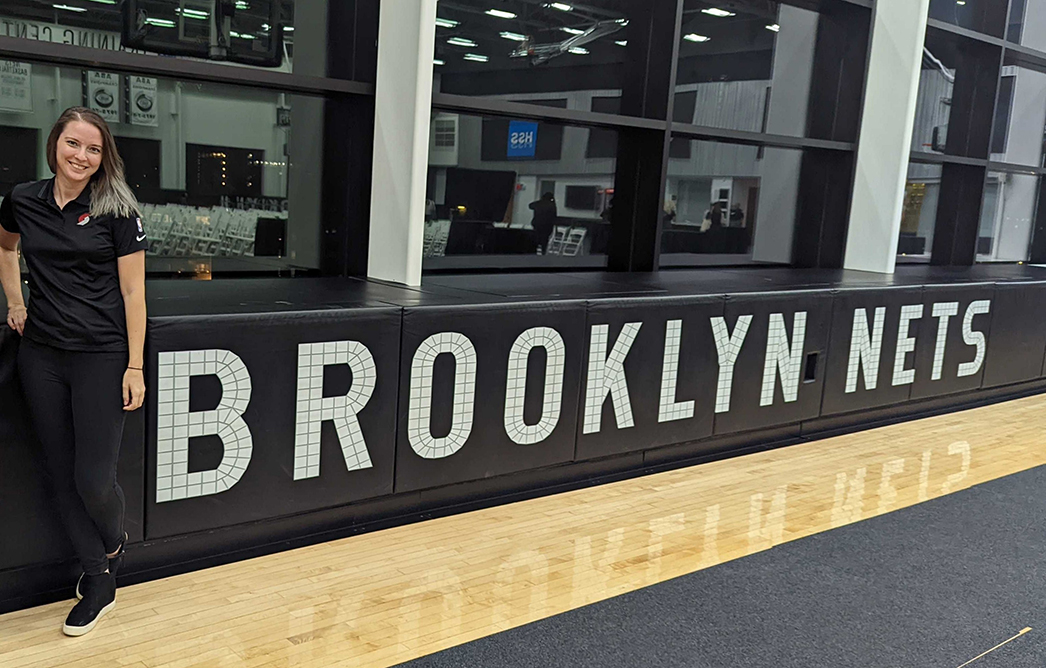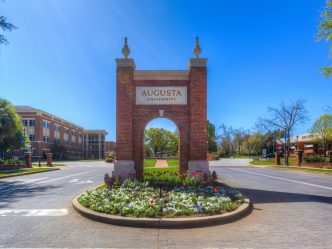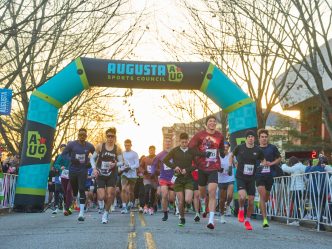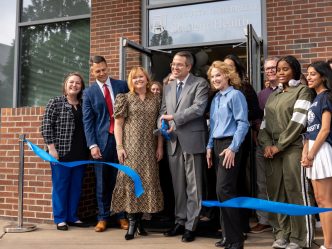Augusta University alumna Katherine Overman didn’t expect her studies to lead to a career in sports data, but she’s now working with one of the nation’s top teams, the NBA’s Portland Trail Blazers.
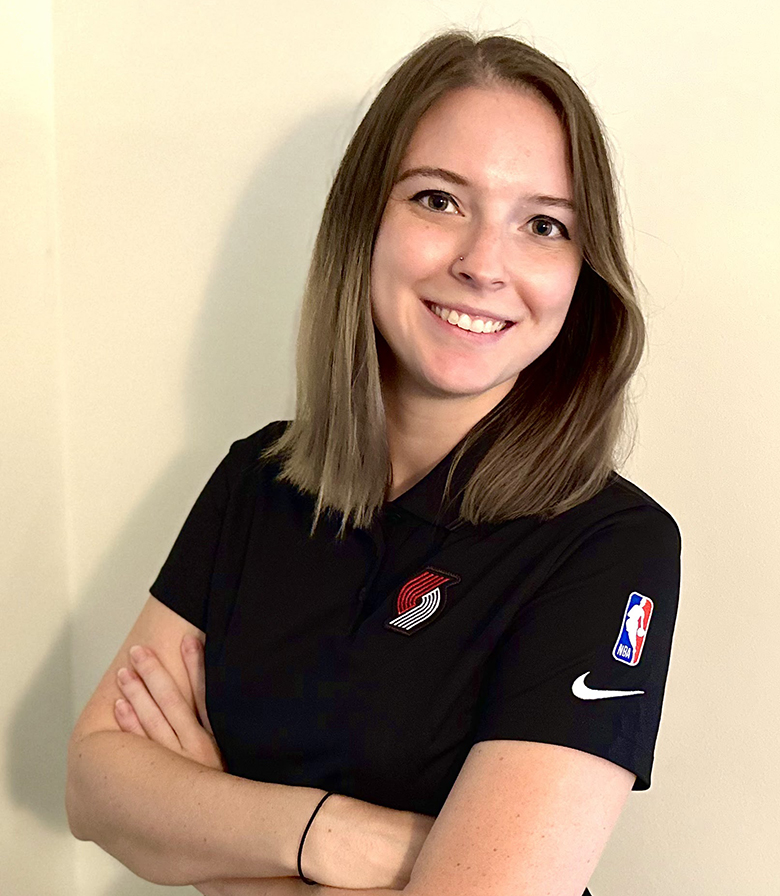
“It still feels a little like a dream!” said Overman, who graduated from Augusta University’s College of Science and Mathematics with a double major in math and physics.
“I was definitely interested in working with sports data even while I was working on my PhD. I had a data set from Atlanta United but never got around to doing anything worthwhile with it. When I applied for the Blazers job, I never expected to hear anything from them, much less get the job.”
The Thomson, Georgia, native started taking classes when she was a junior in high school through a dual enrollment program at AU, with intentions of transferring to Georgia Tech and studying mechanical engineering. However, she said she had so many positive experiences with the professors and classes that she ultimately decided to stay and complete her degrees at Augusta University.
“I had plans of becoming a professor, so a lot of my extracurriculars involved tutoring in the math and physics centers and being a teacher’s assistant for various intro-level classes and labs,” said Overman, who is a senior data scientist for the Trail Blazers.
“I also participated in the physics and math clubs, including going to conferences and competitions. I gave a handful of presentations during my time there, but my favorite was probably an astrophysics presentation that I gave with another student about weather on other planets in our solar system.
“At the time, there was a series of astrophysics lectures that were open to the public led by one of the professors, and on occasion, students would choose a topic to talk about. While all of these activities just sound like more school, I genuinely enjoyed them, but I also balanced it out by playing a lot of ultimate Frisbee and hanging out with a very supportive network of friends.”
Overman’s dual enrollment in high school allowed her to add the second major as well as a minor in computer science. She said there were only one or two semesters that were “extreme levels of chaos,” making time and stress management a challenge. But she said it helped her develop a strong sense of determination — though she might also call it stubbornness.
“Now, I thrive under pressure with lengthy to-do lists and looming deadlines,” Overman said.
Overman credits Dr. Andy Hauger, professor of physics, and Dr. Sam Robinson, emeritus faculty in the Department of Mathematics, as huge influences during her time at AU, and a big part of why she stayed here for her degree.
Hauger remembers Overman, who he affectionately refers to as “KO,” when she started taking classes while still in high school. Hauger was struck by Overman’s mastery of the fundamentals in the classroom.
“Some people like to pick up a little niche, but her niche was everything,“ Hauger said. “She was also one of those kids that when she would come into class or lab, everybody elevated because she was also very engaged, having fun at school, and learning hard things. She brought a lot to the table that way and had a positive impact on the culture and the attitude of the other students around.”
Overman will be studying in-game dynamics by tracking data through player and overall team movement. She said her interest in computational research began at Augusta, and she later joined a lab at Emory University when she began working on her PhD that is exclusively computational. Her thesis work focused on theoretical biophysics.
“It’s a field I never anticipated going into as I’ve never been a huge fan of biology; however, I found myself quite happy solving biologically themed problems by using computational and physics-based techniques,” she said.
Her thesis work was to measure, quantify and analyze behavioral time series of fruit flies. She studied how behavior changed as a function of age in male and female fruit flies and built a neural network model that reproduced the dynamics of her data but also shed light on how the internal processes might be interacting to produce complex behavioral patterns.
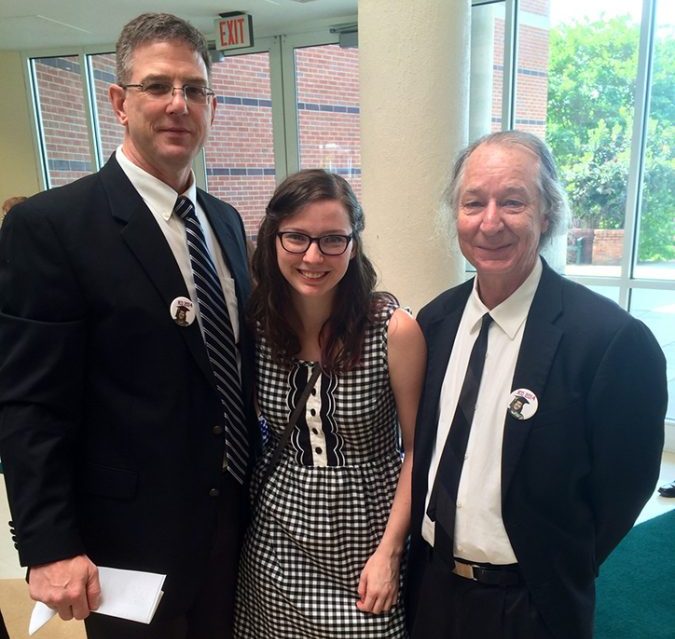
Robinson remembers Overman having an enthusiasm for learning that, likely due to her questions and interactions in class, seemed to spread to her classmates.
“We had a really good group of students in mathematics and physics at that time, and Katherine was a leader among her peers,” he said.
Robinson believes he was just doing his job with the amount of work he and Overman completed over the years, but said she was “one of the brightest and most creative students” he had in more than 30 years of teaching. He also points out her work after she left AU as a testimony to her dedication.
“Earning a PhD in physics from Emory is clear evidence of her drive and determination,” Robinson said. “As for the job with the NBA team, that probably says more about her competence as an analyst and her communication skills.”
Primarily a soccer and Formula 1 fan, Overman played basketball in high school and enjoys watching games, so this new role is a good fit. She has had few challenges with the Trail Blazers job so far, although she is working remotely from Atlanta and said the difference in time zones has led to some late nights. She is a surprised at how working for a professional sports team versus working in a lab resemble one another.
“There have been more similarities than I would have expected. I work on the Research and Development team, and a lot of the projects we’ve discussed feel very much like a research project I’d work on in an academic lab. We even have group meetings that are structured similar to the group meetings I had at Emory.”
 Augusta University
Augusta University
